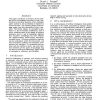Free Online Productivity Tools
i2Speak
i2Symbol
i2OCR
iTex2Img
iWeb2Print
iWeb2Shot
i2Type
iPdf2Split
iPdf2Merge
i2Bopomofo
i2Arabic
i2Style
i2Image
i2PDF
iLatex2Rtf
Sci2ools
102
click to vote
IJCAI
1989
1989
Execution Architectures and Compilation
This paper introduces a partition of the possible forms of knowledge according to their rela tionship to the basic objective of an intelligent agent, namely to act successfully in response to its environment. The resulting classes of knowl edge range from fully declarative to fully com piled. From these classes, it is possible to gen erate 1) a set of execution architectures, each of which combines some of the classes to produce decisions; and 2) a set of compilation methods, that transform knowledge into more efficient but (approximately) behaviourally equivalent, compiled forms. Existing compilation methods can be understood within this framework, and new compilation methods and execution archi tectures are indicated. It is proposed that sys tems with the ability to learn, use and trans form between all the types of knowledge may be able to achieve simultaneously higher levels of competence, efficiency and flexibility.
Related Content
| Added | 07 Nov 2010 |
| Updated | 07 Nov 2010 |
| Type | Conference |
| Year | 1989 |
| Where | IJCAI |
| Authors | Stuart J. Russell |
Comments (0)

